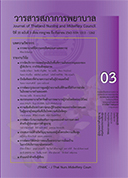High-Risk Pregnant Women’s Spiritual Experiences
Keywords:
high-risk pregnant women, spiritual experiences, lower-Northern Thailand, qualitative researchAbstract
Abstract:
Objective: To explore spiritual experiences that high-risk pregnant women had during their pregnancies.
Design: Qualitative research.
Methodology: The informants were 14 pregnant women treated at the maternity clinic of a tertiary hospital in lower-Northern Thailand. The informants were recruited by means of purposive sampling. Data were collected from April to October 2019 using in-depth interviews. Content analysis was employed for data analysis.
Results: The informants’ spiritual experiences could be summarised as follows. Firstly, a high-risk pregnancy was regarded as one that resulted from an individual’s karma and, therefore, involved more complication, caused greater danger, and required stricter healthcare practices than a normal pregnancy did. Secondly, major spiritual impacts of high-risk pregnancies consisted of frustration with the increased risk, fear of threats to themselves and their fetuses, worries about diffculties and limitations in their lives, and uncertainty about the outcomes of their pregnancies. Thirdly, the informants’ principal means of improving their spiritual health involved seeking spiritual support and spiritual self-development. Lastly, major factors in
the improvement of the informants’ spiritual health included care and encouragement from their families, sympathy from their colleagues, knowledge of their fetuses’ health, and experiences shared by other pregnant women.
Recommendations: This study identifed the spiritual experiences of high-risk pregnant women and their families. According to the fndings, the process of providing high-risk pregnant women with multi-dimensional care that responds to their physical, mental, social, and spiritual needs is a challenge to obstetric nurses in pursuit of true success in holistic nursing care.
Downloads
References
World Health Organization. Trends in maternal mortality: 1990 to 2015 [internet]. 2016 [cited
Apr 15]; Available from: https://www.who. int/reproductivehealth/publications/monitoring/
maternal-mortality-2015/en/
Kor-anantakul O. High risk pregnancy. 2nd ed. Songkhla: Chanmuang; 2008. (in Thai)
Tanasirijiranont R. High risk pregnancy: the nurse midwife roles. Journal of Ratchathani Innovative
Health Sciences 2019;3(1):1-11. (in Thai)
Breen GV, Price S, Lake M. Spirituality and highrisk pregnancy: another aspect of patients care. AWHONN Lifelines [internet]. 2006 [cited 2020 Apr 15]; 10(6):466–73. Available from: https://doi.org/10.1111/j.1552-6356.2006.00095.x
Price S, Lake M, Breen G, Carson G, Quinn C, O’Connor T. The spiritual experience of high-risk pregnancy. J Obstet Gynecol Neonatal Nurs [internet]. 2007 [cited 2020 Apr 15]; 36(1):63-70. Available from: https://doi.org/10.1111/ j.1552-6909. 2006.00110.x
Wilhelm LA, Alves CN, Demori CC, Da Silva SC, Könzgen Meincke SM, Ressel LB. Feeling of woman who experienced a high-risk pregnancy: a descriptive study. Online Brazilian Journal of Nursing [internet]. 2015 [cited 2020 Apr 15]; 14(3):284-92. Available from: http://www.objnursing.uff.br/ index.php/nursing/article/view/5206/html_892
Lasa Vásquez C, Pulido Acuña GP, Castiblanco Montañez RA. The phenomenology of the study of
the experience of high-risk pregnancy. Enfermería Global [internet]. 2012 [cited 2020 Apr 15]; 28:306-15. Available from: https://www.researchgate.net/publication/289340332
Lowdermilk DL, Perry SE, Cashion K, Alden KR, Olshansky EF. Maternal & woman’s health care. 11th ed. St. Louis (MO): Elsevier; 2016.
Jesse DE, Reed PG. Effects of spirituality and psychosocial well-being on health risk behaviors in
Appalachian pregnant woman. J Obstet Gynecol Neonatal Nurs [internet].2004 [cited 2020 Apr 15];
(6):739-47. Available from: https://www.ncbi.nlm.nih.gov/pubmed/15561662
Rabiepoor S, Sadeghi E, Sayyadi H. Spiritual health and physical activity among Iranian pregnant women.
J Relig Health [internet]. 2017 [cited 2020 Apr 15]; 58:506-15. Available from: https://doi.org/10.1007/s10943-017-0487-9
Tongprateep T. Spirituality: a dimension of nursing. Bangkok: V-Print; 2009. (in Thai)
Niaghiha M, Baglooei MM, Maf M, Taherpour, M. Spiritual well-being and life satisfaction in pregnant
women: the mediating role of social support. Soc Health Behav [internet]. 2019 [cited 2020 Apr 15];
(3):83-88. Available from: http://www.shbonweb. com/temp/SocHealthBehav2383-2187244_
Callister LC, Khalaf I. Spirituality in childbearing women. J Perinat Educ [internet]. 2010 [cited 2020
Apr 15]; 19(2):16-24. Available from: https://w w w . n c b i . n l m . n i h . g o v / p m c / a r t i c l e s /
PMC2866430/
Crowther S, Hall J. Spirituality and spiritual care in and around childbirth. Woman and birth [internet].
[cited 2020 Apr 15]; 28(2):173-78. Available from:https://doi.org/10.1016/j.wombi.2015.
001
Cowchock FS, Meador KG, Floyd SE, Swamy GK. Spiritual need of couples facing pregnancy termination because of fetal anomalies. J Pastoral Care Counsel [internet]. 2011 [cited 2020 Apr 15]; 65(1-2):4-10. Available from: https://journals.sagepub.com/doi/pdf/10.1177/154230501106500204
Miller WL, Crabtree BF. Primary care research: a multimethod typology and qualitative road map. In:
Crabtree BF, Miller WL, editors. Doing qualitative research. Louisville (KY): Sage; 1992. p. 3-28.
Licoln VS, Guba EG. Naturalistic inquiry. Berverly Hills: Sage; 1985.
Champion VL, Skinner CS. The health belief model. In: Glanz K, Rimer BK, Viswanath K, editors.
Health behavior and health education: theory, research, and practice. 4th ed. San Francisco: A Wiley; 2008.
p. 45-65.
Badakhsh M, Hastings-Tolsma M, Firouzkohi M, Amirshahi M, Hashemi ZS. The live experience of
women with a high-risk pregnancy: a phenomenology investigation. Midwifery [internet]. 2020 [cited
Apr 15]; 82:102625. Available from: https://doi.org/10.1016/j.midw.2019.102625
Inwang K, Bhudphumpitak W. Development of cultural tourism Phitsanulok. Western University
Research Journal of Humanities and Social Science 2015;1(2):62-77. (in Thai)
Krok D. The role of spirituality in coping: examining the relationships between spiritual dimensions and
coping styles. Ment Health Relig Cult [internet]. 2008 [cited 2020 Apr 15]; 11(7):643–53. Available f r o m : h t t p s : / / d o i . o r g / 1 0 . 1 0 8 0 /13674670801930429
Srisawad K, Panyapinitnukul C, Sonnark N. Health promoting behavior in pregnancy. Songklanagarind
Journal of Nursing 2018;38(2):95-109. (in Thai)
Parke RD. Father involvement: a development of psychological perspective. Marriage Fam Rev [internet].
[cited 2020 Apr 15]; 29(2-3):43-58.Available from: https://doi.org/10.1300/
J002v29n02_04
Satipan C, Sriareporn P, Sansiriphun N. Marital relationship, father-infant attachment and father
involvement in postpartum period. Nursing Journal 2016;43 Suppl December:S71-81. (in Thai)
Pholgaya O. Development of a self-care behavior promoting program with family participation for
pregnant teenagers. Nursing Journal of the Ministry of Public Health 2016;25(3):55-67. (in Thai)








